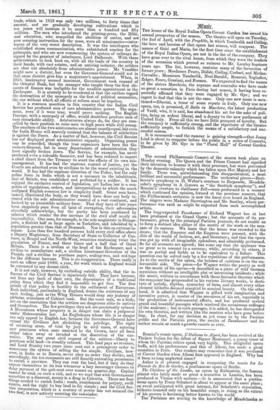The second Philharmonic Concert of the season took place on
Monday evening. The Queen and the Prince Consort had signified their intention to honour it with their presence, but were prevented by the domestic calamity which has fallen upon Her Majesty and her family. There was, notwithstanding this disappointment, a moat brilliant and successful performance. The orchestral pieces—Beet- hoven's symphony in D, Weber's overture to Buryanthe, Mende's-• sohn's symphony in A (known as "the Scottish symphony"), and Rossinrs overture to Guillaume Tell—were performed in a manner which confirmed the opinion, formed at the previous concert, that the Philharmonic orchestra is now the finest ever heard .in England. The singers were Madame Sherrington and Mr. Santley, whose per- formance was such as might be expected from such accomplished artists.
The long-expected Tannhauser of Richard Wagner has at last been produced at the Grand Opera; but the accounts of its per- formance, given by the principal Parisian journals, do not enable us to form a distinct idea either of the merits of the work or the mea- sure of its success. We learn that the house was crowded to the doors; that the Emperor and the Empress were present, with the elite of the world of fashion, art, and literature; and that the opera was got up with all imaginable splendour, and admirably performed. So far all accounts are agreed; but some say that the applause was so great as to amount to a success; while, according to others, it was so partial and feeble as to be equivalent to a failure. This question can be solved only by a few repetitions of the performance. As to the merits of the opera, the balance of opinions is on the un- favourable side. The poem—for Wagner writes the poetry as well as the music of his operas—is described as a piece of wild German mysticism without an intelligible plot or interesting incidents ; while the music, written in accordance with those fantastic theories which the composer has propounded in his various literary works, is desti- tute of melody, rhythm, symmetry of form, and almost every other element hitherto deemed essential to musical beauty. On the other hand, it is admitted that Wagner is gifted with imagination and inventive power, is master of the resources of his art, especially in the production of instrumental effects, and has produced several grand and beautiful passages which received the unanimous suffrages of the audience ; but in such passages, it is added, he has disregarded his own theories, and written like the masters who have gone before him. In short, for any decision as yet come to by the Parisian public and the Parisian press, the merits of Tannhauser and its author remain as much aquastio vacata as ever.






























 Previous page
Previous page